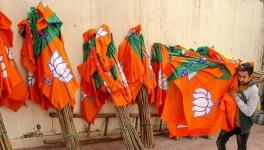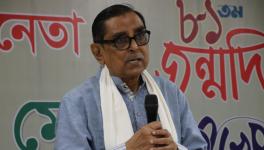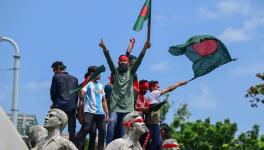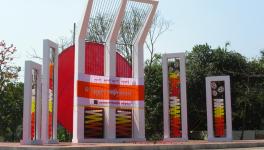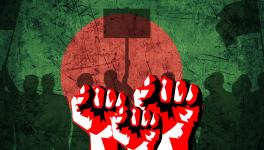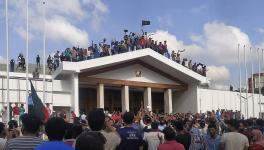Bangladesh: Police Intensify Repression of Student Protests
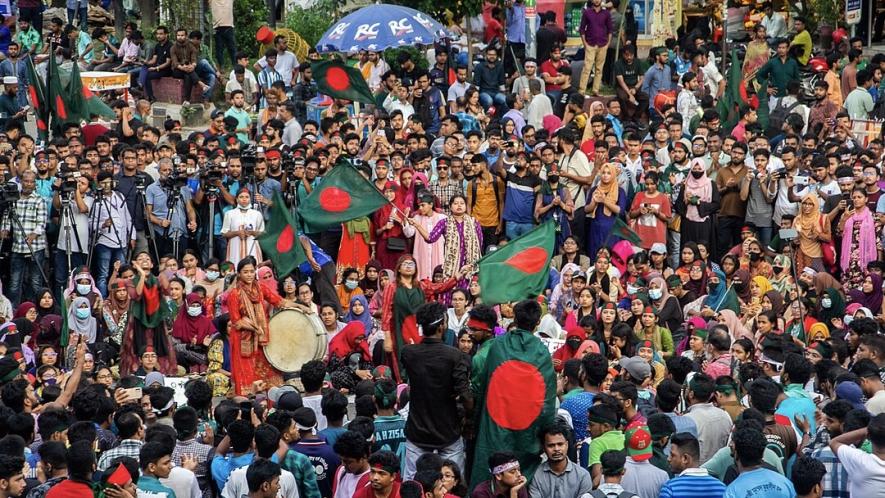
Students have been on the streets in Bangladesh for the past several weeks against the country's quota system for government jobs. Photo: Rayhan Ahmed / Wikimedia Commons
At least six more people were killed and hundreds more were injured in incidents across Bangladesh on Thursday July 18, bringing the death toll of the last three days of protests to at least 12. Students have been protesting for the last several weeks outside their universities and colleges against the country’s quota system for government jobs. These protests have intensified in recent days following violent attacks by the security forces and pro-government student groups. On Tuesday, six, including three students, were killed in this violence.
Hundreds of more students were injured after police and security forces in Bangladesh attacked universities across the country on Wednesday, a day after the government announced shutting down of all educational institutions in the country with the objective of vacating the premises.
There were also reports of security forces attacking the students in various universities across the country, firing live bullets and tear gas while trying to make students abandon the universities. There were reports of firing at Dhaka University, BRAC University, and Canadian University of Bangladesh, all in Dhaka, in addition to similar reports that came from universities in Chittagong, Rangpur and other areas.
In Chittagong, Bangladesh Chhatra League (BCL), affiliated to ruling Awami League and widely considered responsible for violence on Tuesday, again attacked protesting students on Thursday.
On Thursday, four people were killed in Dhaka’s Uttara area after police opened fire on protesters. One student was killed in police violence in Savar and another man was killed in Badda and Rampur areas. Reports indicate members of the ruling party also participated in the attacks.
Students had called for a complete shutdown on Thursday in opposition to “the brutal attack of police-BGB-RAB [Border Guards Bangladesh and Rapid Action Battalion] and SWAT on the peaceful movement of students” on Tuesday and Wednesday. They claimed the protest is “against the murder” and for the “trial of the murderers, terror free campuses and rational reform of the quota system,” Bengali language newspaper Prothom Alo reported.
According to reports, 10 out of 64 districts in the country have reported violent clashes between security forces and protesting students so far.
Sheikh Hasian fails to address core issues
In an address to the nation on Wednesday, Hasina announced a judicial inquiry into the violence on Tuesday. However, she claimed that “terrorists” elements have infiltrated the pro-quota reform protesters despite reports indicating BCL’s involvement in the violence. Hasina reiterated her government’s stand that the apex court would do justice in the quota matter.
“I specially request everyone to wait patiently till the verdict of the Supreme Court comes. I believe our students will get justice from the highest court. They will not be disappointed,” she said.
Many have complained that this attitude has seriously undermined the clear demands of the massive student and youth protests which are against the 30% reservation for the descendants of freedom fighters in government jobs. They demand reforms in the quota system without hampering the reservation of disabled, ethnic minorities and women.
For weeks, the government had refused to take any action,leaving the matter to the country’s apex court. However, on Thursday, the Hasina government finally indicated that it is willing to start negotiations with the agitating students. “Government has agreed to hold talks with the quota reformists,” law minister Anisul Haq has stated.
In the statement issued on its social media on Wednesday Communist Party of Bangladesh (CPB) said that prime minister Sheikh Hasina failed to instill confidence among the people and take to curb violence. It demanded the state take serious steps to punish the perpetrators of attacks against protesting students and seriously address the demand for reforms in the quota system.
CPB called the demand for reforms fair and condemned Hasina for comparing the movement with “terrorism” during her address to the nation on Wednesday. It demanded the state take the demands made by the students seriously to avoid worsening of the situation.
CPB also organized a demonstration on Wednesday against the violence against students in Dhaka. Several groups, such as Amnesty International confirmed that the members of the ruling party were involved in the attacks on students. These groups demanded immediate halt in attacks and negotiations with the protesters.
Get the latest reports & analysis with people's perspective on Protests, movements & deep analytical videos, discussions of the current affairs in your Telegram app. Subscribe to NewsClick's Telegram channel & get Real-Time updates on stories, as they get published on our website.











